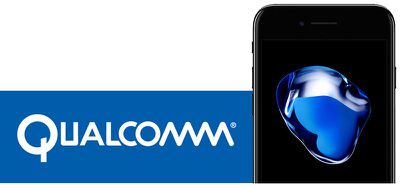Qualcomm Wants Apple to Pay $31 Million in Damages in Patent Battle
Qualcomm today told a San Diego jury that it wants Apple to pay $31 million in damages for patent infringement violations, which is allegedly equivalent to $1.40 per infringing iPhone.
The new information comes from CNET, which has been covering the Qualcomm vs. Apple patent trial that's in court this week.

$1.40 per iPhone and a total of $31 million in damages suggests that Qualcomm believes only 22 million iPhones are infringing on its technology. Qualcomm came up with that total with the help of economist Patrick Kennedy, who took the stand as an expert witness for Qualcomm today. Kennedy calculated the figure based on iPhones sold from July 2017 on that used chips by Intel. Apple started using a mix of chips from both Intel and Qualcomm in the iPhone 7, and later transitioned to all Intel chips due to the legal troubles with Qualcomm.
Qualcomm and Apple are fighting over three patents that Qualcomm says Apple infringed on with its iPhones. As CNET describes, one of the patents covers a method for allowing a smartphone to quickly connect to the internet once turned on, while another covers graphics processing and battery life. The third patent Apple is accused of violating allows apps to download data more easily by directing traffic between the apps processor and modem.
Apple just last quarter earned more than $20 billion in profit, so $31 million in damages wouldn't be a hit to the company's bottom line. If Qualcomm wins the trial, though, its claim that its technology is at the "heart of every iPhone" would be more credible.
Apple and Qualcomm have been fighting since January 2017, when Apple sued Qualcomm for $1 billion in unpaid royalty fees. Qualcomm countersued, and since then, the two companies have levied multiple lawsuits against one another. Two of Qualcomm's lawsuits have resulted in import bans in Germany and China, both of which Apple was able to skirt with hardware and software updates.
The current patent trial between Apple and Qualcomm will last through next week.
Popular Stories
Apple turns 50 this year, and its CEO Tim Cook has promised to celebrate the milestone. The big day falls on April 1, 2026.
"I've been unusually reflective lately about Apple because we have been working on what do we do to mark this moment," Cook told employees today, according to Bloomberg's Mark Gurman. "When you really stop and pause and think about the last 50 years, it makes your heart ...
While the iOS 26.3 Release Candidate is now available ahead of a public release, the first iOS 26.4 beta is likely still at least a week away. Following beta testing, iOS 26.4 will likely be released to the general public in March or April.
Below, we have recapped known or rumored iOS 26.3 and iOS 26.4 features so far.
iOS 26.3
iPhone to Android Transfer Tool
iOS 26.3 makes it easier...
Apple recently acquired Israeli startup Q.ai for close to $2 billion, according to Financial Times sources. That would make this Apple's second-biggest acquisition ever, after it paid $3 billion for the popular headphone maker Beats in 2014.
This is also the largest known Apple acquisition since the company purchased Intel's smartphone modem business and patents for $1 billion in 2019....
Apple plans to announce the iPhone 17e on Thursday, February 19, according to Macwelt, the German equivalent of Macworld.
The report, citing industry sources, is available in English on Macworld.
Apple announced the iPhone 16e on Wednesday, February 19 last year, so the iPhone 17e would be unveiled exactly one year later if this rumor is accurate. It is quite uncommon for Apple to unveil...
In the iOS 26.4 update that's coming this spring, Apple will introduce a new version of Siri that's going to overhaul how we interact with the personal assistant and what it's able to do.
The iOS 26.4 version of Siri won't work like ChatGPT or Claude, but it will rely on large language models (LLMs) and has been updated from the ground up.
Upgraded Architecture
The next-generation...






















